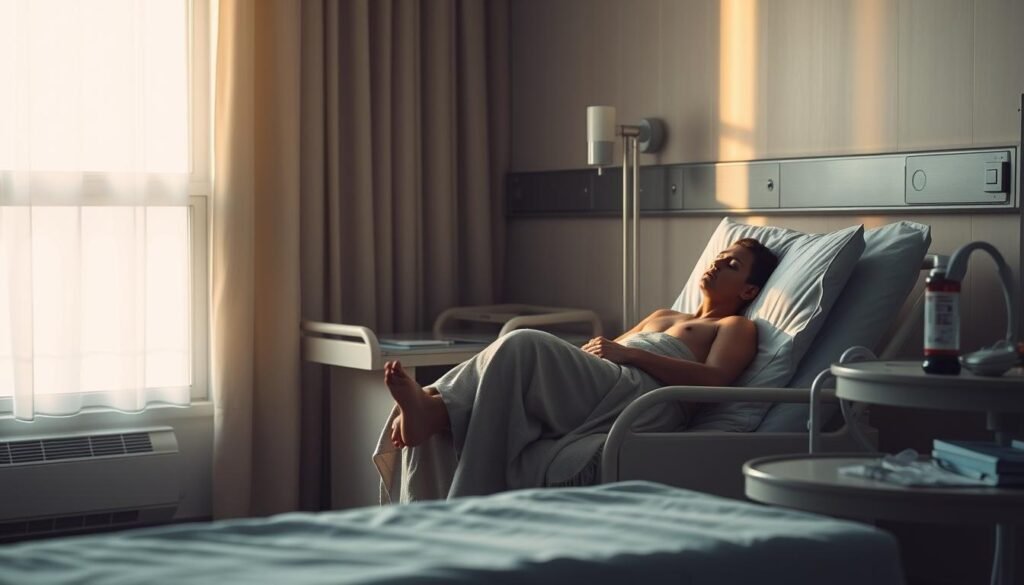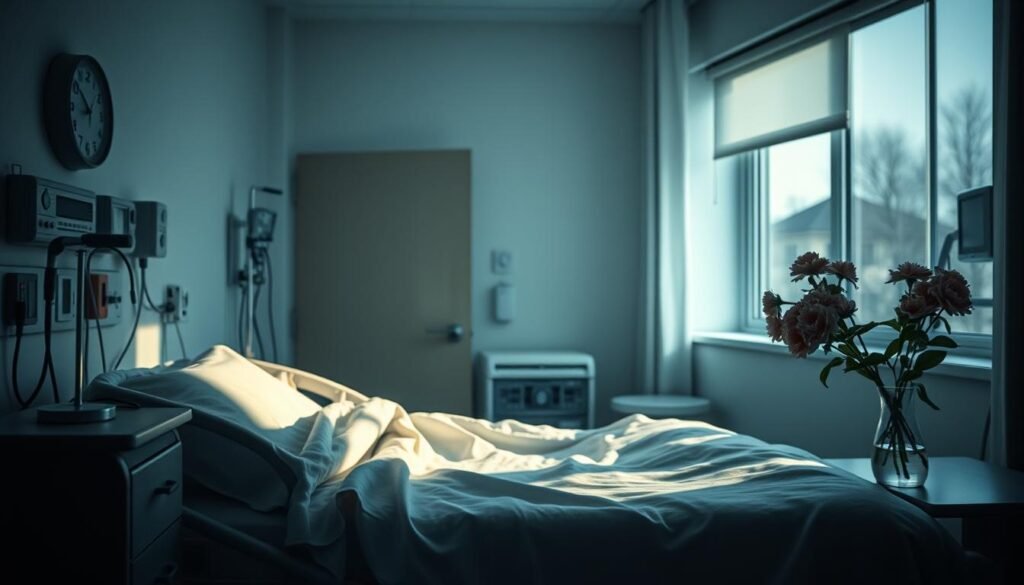About one-third of patients feel very tired after radiation therapy. They may feel this way for over five years. This shows how serious fatigue can be as a side effect of radiation. While most side effects get better within a few months after treatment, fatigue often lasts longer. It can really change how well cancer survivors live and do everyday things.
It’s important to know how long you might feel tired after radiation therapy. This can help patients and the people taking care of them deal with cancer fatigue better. In this article, we look at what causes radiation-induced fatigue, how long it can last, and how to feel more energetic after treatment.
Key Takeaways
- Fatigue is a common side effect of radiation therapy, worsening as treatment progresses.
- Most side effects, including fatigue, generally improve within a few months after treatment ends.
- Many patients experience RIF, with some facing prolonged fatigue lasting several years.
- Understanding individual risk factors can help in managing radiation fatigue duration.
- Effective strategies for recovery include exercise and proper nutrition.
Understanding Radiation-Induced Fatigue
Fatigue from cancer treatment significantly concerns those in therapy. This tiredness can linger, affecting day-to-day life and emotional health. Recognizing different fatigue types is key to understanding patient experiences.
Definition of Cancer-Related Fatigue
Cancer-related fatigue (CRF) is common in patients, especially with radiation therapy. It’s not just feeling tired; it’s often overwhelming and rest doesn’t help. Over 80% of cancer patients feel fatigue during and after treatment.
This fatigue affects both physical and emotional well-being. Addressing it is crucial for improving life quality.
Characteristics of Radiation-Induced Fatigue
Radiation-induced fatigue (RIF) shows in various ways, depending on the cancer type, treatment, and individual response. Common traits of RIF include:
- Varying onset: Fatigue may start quickly after the first treatment or slowly during therapy.
- Emotional impact: As fatigue grows, patients might feel more distressed, anxious, or depressed.
- Prolonged duration: Some see fatigue lessen weeks after treatment ends, while others feel tired for longer.
Knowing the side effects of radiation therapy, like fatigue, helps manage expectations. Using the right strategies to address fatigue can improve patients’ quality of life.
Why Does Radiation Cause Fatigue?
Radiation therapy is crucial for many fighting cancer. But, it often leads to fatigue that can lower their life quality. Knowing why this happens helps patients deal with the tiredness. It also makes their recovery period more understandable.
Impact on Healthy Cells
While targeting cancer cells, radiation can also affect healthy cells nearby. This damage slows down the body’s recovery, making fatigue more common. For example, treatments targeting the brain, chest, or pelvis can have unique side effects.
- Brain treatments: fatigue, hair loss, and concentration issues.
- Breast radiation: fatigue, tenderness, and skin changes.
- Chest radiation: fatigue and possible breathing problems.
- Pelvic radiation: fatigue along with nausea and bladder issues.
These side effects may last even after the treatment ends. Talking to healthcare providers about these symptoms is important. It helps set the right expectations for recovery.
Effects on Red Blood Cells and Oxygen Levels
The body needs healthy red blood cells to move oxygen around. Radiation can lower these cell counts, making oxygen transfer harder. This can make the fatigue worse. Furthermore, about 40% of radiation fatigue is due to not eating properly.
For those looking for natural relief, changing their diet or managing stress better might help. Techniques like yoga or meditation can also improve well-being during recovery.

Understanding what causes radiation-induced fatigue helps patients. It opens up conversation with doctors about managing this tiredness better. This is key during the recovery from radiation treatment.
What Does Radiation Fatigue Feel Like?
It’s essential to know what radiation fatigue really means. It’s not just being tired. It affects life in big ways. Understanding the symptoms helps patients get the right support and find ways to cope.
Symptoms Description
Those who feel fatigue after radiation say it’s much more than normal tiredness. It can be both physical and mental, leading to:
- Persistent tiredness that rest does not alleviate
- Cognitive difficulties such as trouble concentrating
- Emotional challenges, including feelings of sadness or depression
- Reduced motivation to engage in daily activities
- Sleep disturbances that complicate recovery efforts
These symptoms tend to get worse towards the end of treatment. This shows the importance of overall care and support.
Comparison to Regular Fatigue
Radiation fatigue is worse than normal tiredness. Unlike everyday fatigue, resting doesn’t easily fix radiation fatigue. It brings multiple challenges such as:
- Duration: Normal fatigue goes away with rest, but radiation fatigue can last for weeks or months.
- Impact on Quality of Life: Even simple tasks can become too hard.
- Physical and Mental Load: It affects both your body and mind, unlike normal tiredness.
Finding the right management strategies can improve symptoms. Learn more about options like acupuncture or mindfulness. For further information on coping with fatigue, visit these alternative therapies.

When Does Radiation Fatigue Start?
Knowing when radiation fatigue starts is key for patients on their treatment path. This fatigue is common and can interfere with daily activities. Yet, understanding its timing helps in managing cancer fatigue.
Timeline During Treatment
Radiation fatigue usually shows up by the third week of treatment. By the sixth week, as the body absorbs more radiation, fatigue becomes much worse. Many say that fatigue levels off after this, staying the same until treatment is done.
Several factors impact when and how strongly fatigue hits. These include how far patients travel for treatment, their level of tiredness before starting, and the tumor’s size.
Post-Treatment Symptoms
After finishing radiation therapy, fatigue often starts to lessen over the next one to two months. While many feel better during this time, some find fatigue lingers much longer. It’s important to know that fatigue can last over five years for about one-third of patients.
This understanding helps in planning recovery activities and talking about ongoing fatigue with healthcare providers.

| Week of Treatment | Fatigue Level |
|---|---|
| 1-2 | Minimal fatigue noted |
| 3 | Fatigue begins to worsen |
| 4-5 | Fatigue significantly intensifies |
| 6 | Fatigue plateaus until treatment ends |
| Post-treatment (1-2 months) | Gradual decrease in fatigue |
| Ongoing (5+ years) | Possible prolonged fatigue for some |
How Long Does Fatigue Last After Radiation?
Understanding how long it takes to recover from radiation fatigue is crucial. Everyone experiences it differently. While some get their energy back quickly, others might feel tired for a lot longer.
Typical Recovery Timeline
Most patients begin to feel less tired 1 to 2 months after therapy ends. Initially, the side effects of radiation can get worse. Fatigue often starts by the third week and gets more intense over time.
After finishing radiation therapy, fatigue usually peaks within the first two weeks, especially for those who had brain radiation. Alarmingly, about one-third of patients feel tired for up to five years or more. This shows just how varied recovery times can be.
Factors Influencing Duration
Several factors affect how long you’ll feel tired after radiation. These include:
- Age: Older people may take longer to recover.
- Existing Fatigue: If you were already tired before treatment, recovery might be harder.
- Extent of Radiation: More radiation can mean longer periods of fatigue.
- Individual Health: Having other health issues can also extend recovery time.
It’s important to think about these factors when planning how to deal with radiation fatigue.
Risk Factors for Prolonged Radiation Fatigue
Radiation treatment recovery time varies from person to person. It’s important to know the risk factors that can make fatigue last longer. Certain situations can greatly affect how tired you feel, making recovery harder.
Patient Circumstances Impacting Fatigue Levels
Many things affect how long you might feel tired after surviving cancer. Here are some factors that can make you feel more tired and for longer:
- Distance to Treatment Facilities: Travelling far for treatment can tire you out more.
- Pre-existing Fatigue: People already dealing with constant tiredness may feel even more tired during recovery.
- Age: Older people often get more tired because their bodies don’t heal as fast.
- Volume of Tissue Treated: Treating larger areas can damage more tissue, leading to more tiredness.
- Lifestyle Choices: Smoking and not being healthy overall can make you feel more tired while recovering.
Modifiable and Non-modifiable Factors
Knowing about both changeable and unchangeable risk factors helps in managing recovery better. You can change some habits or your environment to reduce tiredness.
| Factor Type | Examples |
|---|---|
| Modifiable |
|
| Non-modifiable |
|
Recovering From Radiation Fatigue
Getting better from radiation fatigue is tough, but knowing your options helps a lot. Many methods can assist people in feeling better and getting their energy back. Health experts often suggest custom plans that include different ways to deal with this fatigue.
Understanding Treatment Options
There are many ways to fight fatigue after radiation. Patients might find relief through:
- Medications, like painkillers and antidepressants, help with pain and mood.
- Cognitive behavioral therapy, which aids in mentally tackling fatigue and its impact on life.
- Physical therapy, boosts mobility and health.
- Acupuncture and other methods target treatment-related discomfort.
- Meditation and similar techniques improve relaxation and focus.
Role of Exercise in Recovery
Exercise is key in beating radiation fatigue. Regular, moderate exercise boosts energy and life quality. Research shows that aerobic exercises, like walking or swimming, with strength training, reduce fatigue. Staying active helps people by:
- Boosting muscle strength and endurance
- Lowering anxiety and depression symptoms
- Improving sleep and overall health
Seeing the big picture in recovery is important. It makes overcoming radiation-induced fatigue easier. Everyone’s journey is unique, but these methods offer helpful ways to restore energy and health.
Radiation Fatigue Relief Strategies
To manage fatigue from radiation, you should consider changing your lifestyle. Using smart strategies can really improve how you feel. These methods boost well-being and energy.
Importance of a Balanced Diet and Hydration
Eating right is key to fight off fatigue. It’s crucial to keep a balanced diet and stay hydrated. The right foods keep your energy up during treatment. Here’s what to do:
- Consume high-calorie and protein-rich foods to support energy needs.
- Eat small, frequent meals to keep energy levels stable.
- Include healthy fats to promote overall health.
- Stay well-hydrated to aid bodily functions and combat fatigue.
Keep track of what you eat and drink. This helps maintain your health during and after treatment.
Mind-Body Techniques for Relief
Mind-body practices can help ease fatigue from radiation. Try yoga, meditation, or deep breathing to clear your mind and relax. These activities reduce tiredness and build emotional strength. Find what works best for you.
Mixing diet changes with mind-body exercises forms a strong plan against fatigue. Keep an eye on your symptoms. This way, you can fine-tune your strategy for the best outcome.
Conclusion
It’s important to understand how long fatigue lasts after radiation. This is essential for those with cancer and their support circles. Up to 77% of breast cancer patients feel tired from radiation. Knowing about this and how it varies is key.
Patients start feeling tired during treatment. This tiredness can range from mild to very severe. The severity affects their day-to-day lives. That’s why knowing how to manage this fatigue matters a lot.
Fighting radiation-induced fatigue is more than just knowing about it. Tools like the Fatigue Symptom Inventory help doctors find the right treatments. Using non-drug strategies and therapies improves patient health. Sometimes, drugs like methylphenidate are needed too.
Support from healthcare teams and family is crucial for survivors. Using many strategies helps patients deal with fatigue better. For more on fatigue and its impact, click here.